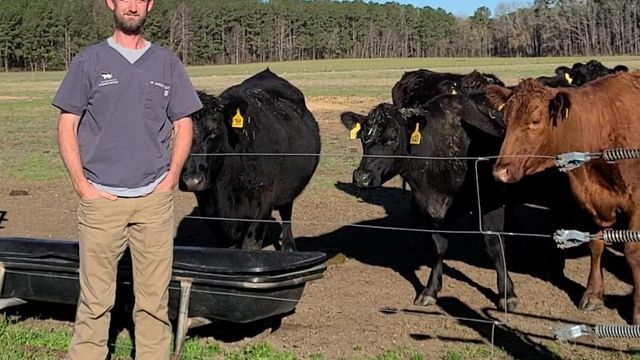Kinston livestock veterinarian credits NC State College of Veterinary Medicine for encouragement and direction
Though Dr. Harrison Dudley was familiar from a young age with large animal medicine, as his family trained and exhibited performance horses, he never expected to become a veterinarian. His path was guided by professional and encouraging mentors at the NC State College of Veterinary Medicine.
Posted — UpdatedVeterinarians enter the profession from a variety of paths. Many know from an early age that animal medicine is their calling, while others come at it from a different perspective. For Harrison Dudley, DVM, it was the advice and mentorship of valued faculty members at the NC State College of Veterinary Medicine that eventually brought him into the fold.
"I was not the kind of student who knew he wanted to become a veterinarian," Dr. Dudley revealed. "I kind of backed into it based on the encouragement of people I respected."
Dr. Dudley’s family trained and exhibited performance horses, so he was exposed to large animal medicine from an early age. "I had extended family members who farmed, and I lived in an agricultural community," he said. "It was around me. I just didn’t participate in it until I was in college."
Attending NC State on a scholarship but undecided on a career path, Dr. Dudley took an animal science class and during the first session found himself out on the college’s farm, where he got to work hands-on with cows.
"That lab opened my eyes," Dr. Dudley said. "It was the first time I had been that close to a cow. I took a job at the university dairy, and it just blossomed from there. I knew I wanted to help people and be involved with animals, so food-animal medicine and production allowed me to meld those two interests."
Dr. Dudley graduated from the NC State College of Veterinary Medicine in 2012 and went directly into private practice in Siler City. Two years later, he accepted a position as a clinical veterinarian at the College of Veterinary Medicine with a focus on beef cattle production and medicine. He taught there for four years then accepted a position as an associate veterinarian with his current employer, Livestock Veterinary Services in Kinston.
"My clients are for-profit farmers, both large- and small-scale," Dr. Dudley observed. "That’s how they feed their families and pay their bills, so we really try to encourage a higher level of management and business awareness rather than just the ‘fire engine’ kind of veterinary services. At the end of the day, we want our clients to be successful and have a well-managed and healthy herd so they can be as productive as possible."
Dr. Dudley’s days are long, and he’s on the road a lot. "I jokingly say I’m a truck driver who performs veterinary medicine on the side because I spend a lot of hours driving between clients," he said. "I travel from client herds in the mountains of North Carolina to the coast and up to the border, both north and south."
Dr. Dudley credits his time at the NC State College of Veterinary Medicine with much of his professional success, noting that it exposed him to some of the greatest minds in the veterinary world. "It also helped me build a network of professionals who have supported me and molded me into the clinician I am now," he said. "I had the double benefit of also working there alongside the people who helped guide me in my formative years. I learned probably as much, if not more, as a clinician by teaching students who are now practitioners because it takes a lot to stand up in front of a class of 100 students when you’re only a few years out of school yourself."
Like most veterinary students, Dr. Dudley found the rigors of veterinary school challenging. "You’re in class for eight hours a day, then you go home and study. If you get even one day behind, it can be difficult," he said.
Nonetheless, Dr. Dudley looks back fondly at those who encouraged and mentored him at the College of Veterinary Medicine. "Peter Farin, who passed away my third year, was incredibly encouraging to me," he noted. "I don’t know what he saw in me at the time, but he very much prodded and encouraged me to think about the things I was excited about and to follow that path. He opened my eyes to opportunities and saw things inside me that he fostered."
Dr. Maria Correa, Professor of Epidemiology and Public Health at the College of Veterinary Medicine, was another who took Dr. Dudley under her wing, encouraging him to think about the food-animal industry from a global perspective. Toward that goal, she took Dr. Dudley with her to Uruguay for a summer to study cattle production.
Today, Dr. Dudley looks on with pride as his two sons show a growing interest in following in his footsteps. They often accompany him on the road and interact with his clients. "When my 7-year-old started to show an interest [in medicine], that really made me feel like the decisions I’ve made in life were the right ones," he said.
Copyright 2024 by Capitol Broadcasting Company. All rights reserved. This material may not be published, broadcast, rewritten or redistributed.






